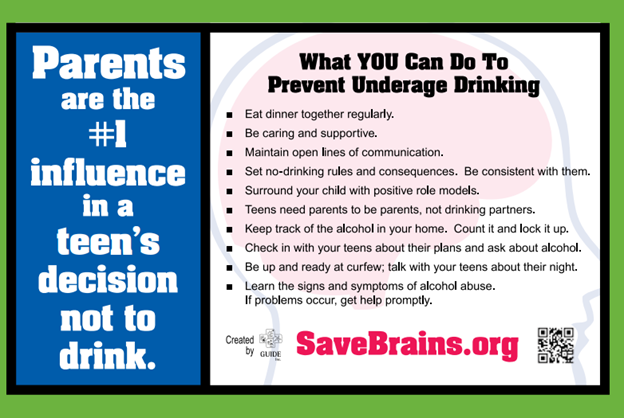
Alcohol – Underage Drinking Guide
Overview
Underage drinking is a serious public health problem in the United States. Alcohol is the most widely used
substance of abuse among America’s youth, and drinking by young people poses enormous health and safety risks. Reducing underage drinking will require community-based efforts to monitor the activities of youth and decrease youth access to alcohol.
Reducing underage drinking will require community-based efforts to monitor the activities of youth and
decrease youth access to alcohol. Recent publications by the Surgeon General and the Institute of Medicine outlined
many prevention strategies for the prevention of underage drinking, such as enforcement of minimum legal drinking age laws, national media campaigns targeting youth and adults, increasing alcohol excise taxes, reducing youth exposure to alcohol advertising, and development of comprehensive community-based programs.
Data points
- 8.5% of high school students in Georgia report drinking alcohol in past 30-days.
- Youth who begin drinking before 15 are 5x more likely to abuse or become dependent on alcohol than those
- who begin drinking after 21 and in 2019, 18.2% of GA high schoolers reported that they had their first drink of
- alcohol, other than a few sips, before the age of 15.
- Most alcoholics in America begin drinking before age 18.
- Alcohol use interrupts normal brain “wiring” by slowing down brain activity and development.
Social Host Liability
- An adult allowing underage drinking on property they own, rent, or lease is referred to as a “Social Host”.
- Current Georgia Laws only hold accountable an individual that gives an underage person alcohol if they know that they will be driving.
- 35 States have adopted Social Host Laws including our contiguous states.
Frequently Asked Questions:
How does alcohol affect a person?
Alcohol affects every organ in the body. It is a central nervous system depressant that is rapidly absorbed from the
stomach and small intestine into the bloodstream. Alcohol is metabolized in the liver by enzymes. However, the liver can only metabolize a small amount of alcohol at a time, leaving the excess alcohol to circulate throughout the body. The intensity of the effect of alcohol on the body is directly related to the amount consumed.
Why do some people react differently to alcohol than others?
Individual reactions to alcohol vary, and are influenced by many factors, such as:
- Age.
- Sex.
- Race or ethnicity.
- Physical condition (e.g. weight, fitness level).
- Amount of food consumed before drinking.
- How quickly the alcohol was consumed.
- Use of drugs or prescription medicines.
- Family history of alcohol problems.
Isn’t it safer for teens to drink at home than elsewhere?
Adult supervised drinking actually results in more overall drinking in places other than home.
Sources: Substance Abuse and Mental Health Services Administration (SAMHSA), 2017. Centers for Disease Control and Prevention (CDC),
Fact Sheets: Underage Drinking. Pacific Institute for Research and Evaluation, 2009).

